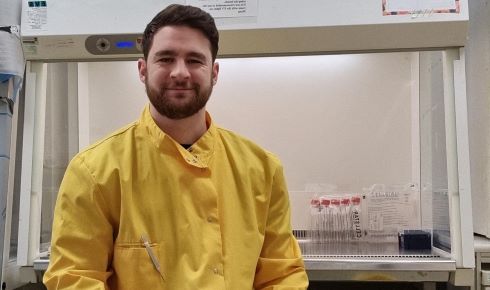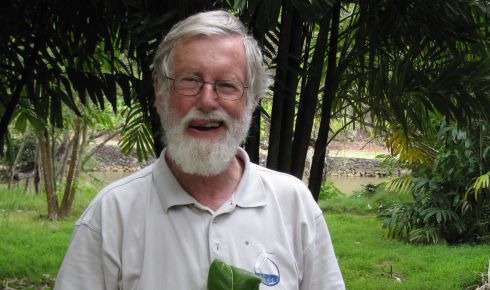Member Profiles
6th September 2024
Our latest profiles explore the working life of Joshua Bateman and his research into microplastics, and the incredible botany career of Sir Ghillean Prance
A DAY IN THE LIFE
Joshua Bateman MRSB is a PhD candidate and research officer in the In Vitro Toxicology Group at Swansea University, studying the effects of microplastics.

My alarm goes off...
At 06:00. I try to get some sunlight first thing in the morning, so will eat my breakfast in the garden (or in front of a daylight lamp on dark winter mornings) before I do some stretching while watching the news. I then drive half an hour to work at Swansea University, which is right by the beach.
My work involves…
Examining the toxicological effects of air pollutants on human lungs. My UK Health Security Agency-funded PhD project investigated the effects of particulate matter and nitrogen dioxide co-exposure, with particular focus on the toxicity at the level of the alveoli.
I have now started a postdoctoral research project funded by the Colt Foundation to investigate the potential effect of the inhalation of micro/nanoplastics on the respiratory system. Micro/nanoplastics are an emerging health concern and have already been shown to lead to potential toxic effects following ingestion. The inhalation hazard, however, is less clear. The research I am conducting aims to clarify this.
Within the lab, we also have a focus on advanced in vitro approaches. This is done through the continual development of anatomically relevant cell culture models, intended to be replicative of in vivo/human tissues, as well as advanced air pollutant exposure techniques.
On a typical day…
I arrive at work at 07:30 and get straight into the lab while it is still quiet. I normally begin the workday within the cell culture laboratory, before continuing with other techniques, often looking at quantifying inflammatory markers or conducting PCR, targeting genes related to various toxicological outcomes. I then use the afternoons for office work, which could include writing my PhD thesis, articles or abstracts, making conference presentations, data analysis or reading papers.
Right now…
I am spinning two plates – writing my PhD thesis, which needs to be submitted within the next three months, and working on the micro/nanoplastics project described above in the same institute.
After work…
I like to keep active, so will often go to the gym on the way home. As a foodie, I like to cook and try new foods – normally the first thing I do when I get through the front door. Then later in the evening, I regularly spend time in my garage where I upcycle furniture and embark on woodworking projects.
THE CAREER LADDER
Sir Ghillean Prance FRS FRSB, botanist, ecologist and former director of the Royal Botanic Gardens, Kew, on an incredible life-long career.

I first discovered biology...
As a child and I was encouraged by two elderly aunts who were keen amateur botanists. By age 11 I knew that I wanted to go to university to study botany. I had the fortune to be in the house at school with the biology master in charge. I owe a lot to Mr Wilson for encouraging the development of my hobby into academic study.
I studied…
At Oxford University and graduated with a BA in botany in 1960. Having developed a special interest in plant taxonomy and field work I joined a plant collecting expedition to Turkey for three months. I spent the next three years working for a PhD in forest botany on a generic revision of the tropical plant family Chrysobalanaceae.
A pivotal point in my career…
Was the interest of Dr Bassett Maguire, curator of the New York Botanical Garden (NYBG) herbarium. After a reference check with my doctoral supervisor (unknown to me), Maguire invited me for a one-year postdoc to study and identify his herbarium collections of Chrysobalanaceae. To make it easier to cover my transport to the US, he even asked me to join a botanical expedition in 1963 to the Juliana Gebergte mountains of Suriname. Three months in the rainforest with an experienced botanist and expedition leader, Howard Irwin, was enough to settle my career for life.
After a year in New York, my postdoc was extended for a year to lead a plant collecting expedition to Brazil. From 1963 to 1998 I made 39 expeditions to Amazonian Brazil, Peru and Venezuela, and published many papers. I rose up through the ranks of NYBG to become senior vice-president for research in 1981, and became the founding director of the NYBG Institute of Economic Botany.
The only break in my 25 years at NYBG was a two-year leave of absence to set up the first postgraduate course in botany in Manaus, Brazil. Stimulating a group of young Brazilians to become interested and qualified in the conservation of the Amazon rainforest is one of the most important things I have done in my career.
Another pleasing aspect of my career…
Has been discovering many unnamed new species of plants and fungi (about 350). Perhaps the worst was nearly dying of malaria. Phase two of my career was a surprise as I was invited to apply for the directorship of the Royal Botanic Gardens, Kew. I spent 11 years from 1988 to 1999 as director of the world’s greatest botanical garden. I feel the best achievements during my time at Kew were the introduction of molecular biology to the research programme and the establishment of the Millennium Seed Bank at Wakehurst Place.
I retired…
From Kew in 1999 at the compulsory age of 62, and entered my third career phase as an independent scientist and Honorary Research Fellow at Kew. During this stage of ‘phantom’ retirement, I have produced 10 books and 167 scientific papers. I’m now 86 and will continue this phase of my career as long as health permits because I have never lost my interest in how plants work.
My success in life is…
Due to making my childhood love of natural history into a rewarding and interesting career. My advice to young scientists is to choose the aspect of science that is most interesting to you. Lastly, when you reach retirement, do not give up. The way to keep young is to continue to stimulate your scientific interests and keep your brain working.
Something not many of my colleagues will know about me…
Is that I enjoy playing my piano accordion.


